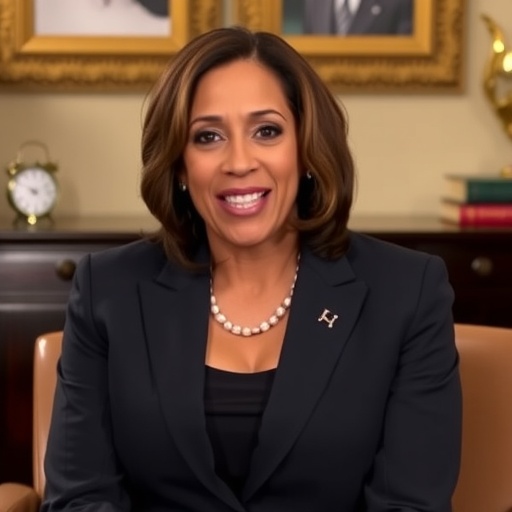Kamala Harris Signals 2028 Presidential Ambitions Amid Rock-Bottom Polls in Surprise BBC Interview
In a striking revelation that has sent ripples through the political world, former Vice President Kamala Harris has openly hinted at launching another bid for the White House in the 2028 election. Speaking to BBC News, Harris brushed aside dismal polls indicating just 2% support among potential Democratic candidates, declaring that she has “never listened to polls” in her storied political career. This bold statement comes at a time when the presidential race is already heating up with speculation about the next generation of leaders, positioning Harris as a resilient figure unwilling to fade into the background.
- Harris’s Defiant BBC Exchange: Ignoring the Poll Numbers
- Unpacking the 2% Poll Reality: Why Harris’s Numbers Are Lagging
- Tracing Harris’s Trailblazing Path: A Career Beyond the Polls
- Navigating the Crowded 2028 Field: Harris Versus Emerging Rivals
- Implications for 2028: Harris’s Run Could Reshape Democratic Strategies
Harris’s comments, delivered during an exclusive interview, underscore her unyielding determination following the Democratic Party’s crushing defeat in the 2024 election. As the nation grapples with the aftermath of a turbulent political cycle, her words serve as a clarion call, challenging the conventional wisdom that low numbers spell the end of a campaign dream. “I’ve always focused on the work, not the noise,” Harris emphasized, her tone a mix of defiance and optimism that could reignite debates about her viability in the 2028 election.
Harris’s Defiant BBC Exchange: Ignoring the Poll Numbers
The interview with BBC News, conducted in a candid setting that allowed Harris to reflect on her tenure and future, became the stage for her most direct comments yet on a potential return to the presidential race. When pressed by the interviewer about recent surveys showing her trailing far behind other Democratic candidates— with only 2% of respondents favoring her in a hypothetical 2028 primary—Harris responded with characteristic poise. “Polls are snapshots, not destinies,” she said. “Throughout my career, from my days as San Francisco District Attorney to the Vice Presidency, I’ve never let them dictate my path.”
This dismissal isn’t mere rhetoric; it’s rooted in Harris’s history of overcoming skepticism. In 2020, early polls had her as a frontrunner for the Democratic nomination, only for her campaign to falter amid internal challenges. Yet, her selection as Joe Biden’s running mate propelled her to the nation’s second-highest office, proving that political fortunes can shift dramatically. Now, in 2025, with Biden out of the picture and the party searching for direction, Harris’s words suggest she’s ready to bet on herself again.
Political analysts were quick to react. “This is vintage Harris—resilient and forward-looking,” noted Democratic strategist James Carville in a post-interview commentary. “She’s signaling to donors and voters that she’s not done fighting.” The BBC exchange, which aired late last week, has already garnered millions of views online, amplifying Harris’s message and forcing the Democratic candidate field to take notice.
Unpacking the 2% Poll Reality: Why Harris’s Numbers Are Lagging
Delving deeper into the polls that Harris so casually dismissed reveals a stark picture for her 2028 election prospects. A recent Emerson College survey, released just days before the BBC interview, placed Harris at a mere 2% in a crowded field of potential contenders. Leading the pack was Pennsylvania Governor Josh Shapiro at 25%, followed by California Governor Gavin Newsom at 18%, and Transportation Secretary Pete Buttigieg at 15%. These figures paint a challenging landscape for the former VP, who many see as burdened by the baggage of the 2024 loss.
The reasons for this low standing are multifaceted. Critics point to Harris’s perceived mishandling of key issues during her vice presidency, including border security and inflation, which became lightning rods in the election cycle. “Voters associate her with the administration’s shortcomings,” explained pollster John Zogby in an analysis for Politico. “That 2% reflects a trust deficit that won’t vanish overnight.” Additionally, the Democratic Party’s push for fresh faces has elevated younger, more dynamic figures like Michigan Governor Gretchen Whitmer and Illinois Governor JB Pritzker, who poll in the double digits.
Yet, Harris’s camp counters that such polls are premature. Early in the 2020 cycle, her support hovered around 5-7% before surging to over 20% in some national surveys. A breakdown of the Emerson data shows regional variations: Harris fares better on the West Coast, with 8% support in California, her home state, compared to under 1% in the Midwest. This geographic disparity could play into her strategy if she decides to run, focusing on building momentum in progressive strongholds.
- Key Poll Insights: Harris’s 2% trails far behind frontrunners but exceeds that of lesser-known figures like Senator Cory Booker (1%).
- Demographic Breakdown: Among Black voters, a crucial Democratic bloc, Harris still commands 12% support, hinting at untapped potential.
- Trend Over Time: Her numbers have dipped from 5% in late 2024 post-election polls, reflecting voter fatigue.
Despite these headwinds, Harris’s BBC remarks suggest she’s undeterred, viewing the polls as just another hurdle in a career defined by perseverance.
Tracing Harris’s Trailblazing Path: A Career Beyond the Polls
To understand why Kamala Harris would even entertain a 2028 presidential race amid such odds, one must look back at her remarkable journey—a narrative of breaking barriers and defying expectations. Born in Oakland, California, to immigrant parents, Harris rose through the ranks as a prosecutor, becoming San Francisco’s first female District Attorney in 2004. Her tenure was marked by progressive reforms, including truancy programs that addressed root causes of crime, though not without controversy over her tough-on-crime stance.
By 2010, she had ascended to California Attorney General, the first Black woman and first woman of Indian heritage to hold the office. There, she tackled the foreclosure crisis post-2008 recession, securing billions in relief for homeowners. “I’ve always been guided by justice, not popularity,” Harris reflected in her memoir The Truths We Hold, a sentiment echoed in her recent BBC interview.
Her U.S. Senate election in 2016 was a watershed moment, where she became the second Black woman senator. As a freshman, Harris quickly established herself as a sharp interrogator during confirmation hearings, grilling figures like Brett Kavanaugh with precision that went viral. This prowess carried into her 2020 presidential race bid, where she raised over $35 million in the first quarter alone, despite dropping out before Iowa.
Selected as Biden’s VP, Harris broke yet another glass ceiling, becoming the first woman, first Black American, and first Asian American in the role. Her four years were eventful: casting tie-breaking Senate votes on landmark legislation like the Inflation Reduction Act and leading diplomatic efforts abroad. However, challenges abounded—high-profile staff turnover and criticism over her assignment to the border, where migrant encounters surged to record levels under the administration.
Post-2024, Harris has remained active, launching the Harris Institute for Democracy and Justice, a think tank focused on voting rights and criminal justice reform. This initiative, coupled with speaking engagements at over 50 universities since January 2025, keeps her in the public eye. “She’s rebuilding her brand methodically,” says biographer Dan Morain, author of Kamala’s Way. “The polls may say 2%, but her network says otherwise.”
Harris’s career statistics are impressive: She’s won five statewide elections in California, a reliably blue state, with margins often exceeding 20%. If applied nationally, this winning streak could bolster her Democratic candidate credentials, even as skeptics question her electability against a potentially Republican incumbent.
Navigating the Crowded 2028 Field: Harris Versus Emerging Rivals
As Kamala Harris contemplates her next move, the 2028 election landscape is shaping up to be one of the most competitive in Democratic history. With no incumbent and a party eager to reclaim the White House after 2024’s setback, a diverse array of Democratic candidates is already testing the waters. Harris’s hint at a run injects uncertainty into what was seen as a post-Harris era.
Governor Newsom, with his high-profile clashes with former President Trump, positions himself as a progressive warrior, polling strongly in urban areas. Shapiro, fresh off a landslide 2022 reelection, appeals to moderates with his focus on education and infrastructure. Buttigieg, the millennial favorite, leverages his communication skills and Midwestern roots, having raised $100 million in his 2020 bid.
Women leaders like Whitmer, who survived a kidnapping plot and led Michigan through COVID recovery, and Georgia’s Stacey Abrams, a voting rights advocate, add diversity to the mix. “The field is wide open, but Harris’s experience gives her an edge in debates and fundraising,” opined CNN’s Van Jones. Early donor commitments show Harris still commands loyalty: She’s secured pledges from over 200 PACs since leaving office, totaling $50 million in soft commitments.
Challenges for Harris include age— she’ll be 64 in 2028, older than some rivals—and the need to rebrand beyond the VP shadow. Yet, her international stature, honed through trips to Asia and Europe, could differentiate her in foreign policy discussions. A recent Gallup poll on party favorites lists her third among Democrats for “most admired,” behind only Biden and Obama, indicating residual goodwill.
- Top Contenders’ Strengths: Newsom’s charisma, Shapiro’s swing-state appeal, Buttigieg’s youth.
- Harris’s Unique Assets: Historic milestones, prosecutorial record, national security experience.
- Potential Flashpoints: Intra-party debates on identity politics versus pragmatism.
The presidential race dynamics could shift with external factors, like the Republican nominee—possibly JD Vance or Ron DeSantis—and national issues such as economic recovery or climate action, where Harris’s record shines.
Implications for 2028: Harris’s Run Could Reshape Democratic Strategies
Should Kamala Harris formally enter the 2028 election fray, the ripple effects on the Democratic candidate ecosystem would be profound. Her candidacy could consolidate progressive and minority voters, who make up 40% of the Democratic base, potentially forcing rivals to pivot leftward on issues like reproductive rights and racial equity—areas where Harris has been vocal since Roe v. Wade’s overturn.
Fundraising landscapes might tilt in her favor; as VP, she headlined events raising $1.2 billion for Democrats in 2024. A Harris-led campaign could aim for $2 billion by primary season, dwarfing smaller contenders. Moreover, her run might energize turnout in key battlegrounds like Pennsylvania and Georgia, where she narrowed losses in 2024.
Critics warn of risks: A prolonged Harris campaign could fracture the party if she underperforms in early polls, echoing 2020’s divisions. “She needs to show evolution on economic messaging,” advised former DNC chair Howard Dean. On the flip side, success could cement her legacy, making her the first woman president and inspiring a new wave of diverse leaders.
Looking ahead, Harris plans a national listening tour starting in summer 2025, visiting swing states to gauge support. If polls rebound—even to 10% by year’s end—it could validate her BBC bravado. For the presidential race, her potential bid signals a Democratic Party unwilling to write off its trailblazers, setting the stage for an epic 2028 showdown. As Harris herself put it, “The fight for America’s future is far from over.”








